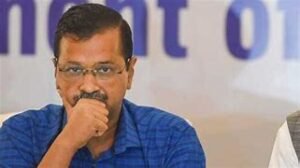The Enforcement Directorate (ED) has filed a supplementary chargesheet implicating Bharat Rashtra Samithi (BRS) leader K Kavitha in the Delhi excise policy scam, alleging her involvement in the laundering of proceeds of crime worth nearly ₹300 crore. The scam, which has drawn significant attention due to its high-profile nature and substantial financial implications, involves a total of ₹1,100 crore laundered through corrupt activities, according to the ED.
Detailed Allegations Against K Kavitha
In the chargesheet filed before Special Judge Kaveri Baweja, the ED has alleged that K Kavitha, daughter of former Telangana Chief Minister K Chandrashekar Rao, conspired with key figures, including members of the purported South Group and Aam Aadmi Party (AAP) leaders, to generate and launder large sums of money. The ED claims that out of the total laundered amount, Kavitha was directly involved in proceeds of crime worth ₹292.8 crore.
Kickbacks to AAP Leaders

One of the most striking allegations in the chargesheet is that Kavitha facilitated kickbacks amounting to ₹100 crore to AAP leaders. These payments were allegedly made through Vijay Nair, who acted on behalf of the top leadership of AAP. The kickbacks were part of a broader scheme to secure undue benefits from the Delhi excise policy.
The Role of IndoSpirits
The ED’s chargesheet highlights the formation of a company named IndoSpirits, which Kavitha allegedly used to mask the illicit proceeds as legitimate business profits. Through this company, she is accused of generating, acquiring, and using ₹192.8 crore as proceeds of crime. The ED asserts that Kavitha was actively involved in showing IndoSpirits as a genuine business entity to recoup the advance bribes paid to government functionaries.
Destruction of Digital Evidence
Another significant aspect of the ED’s allegations is the claim that K Kavitha destroyed digital evidence to conceal her involvement in the scam. The chargesheet mentions that Kavitha presented nine mobile phones for examination, all of which were formatted and contained no data. The ED accuses her of being evasive and unable to provide explanations for the formatted phones, indicating an attempt to obstruct the investigation.
Judicial Proceedings and Custody
K Kavitha was arrested by the ED from her Hyderabad residence on March 15 and has been in judicial custody since. Her custody has been extended until July 3, following a court appearance in response to a production warrant issued after the court took cognizance of the chargesheet on May 29. In the same hearing, the court granted bail to three co-accused—Prince Kumar, Damodar Sharma, and Arvind Singh—who were charged without being arrested during the ED’s investigation.

Influence on Witnesses
The ED has further alleged that Kavitha attempted to influence witnesses in the case, adding another layer of complexity to the charges against her. These allegations, if proven, could further complicate her defense and impact the overall proceedings of the case.
Background of the Excise Policy Scam
The Delhi excise policy scam revolves around alleged corruption and money laundering in the formulation and implementation of the Delhi government’s excise policy for the fiscal year 2021-22. The policy, which has since been scrapped, is alleged to have facilitated large-scale financial irregularities benefiting certain individuals and entities at the expense of public resources.
Implications for K Kavitha and Political Repercussions
The charges against K Kavitha, a prominent political figure and daughter of a former Chief Minister, have significant political repercussions. Her alleged involvement in a high-profile financial scandal not only impacts her political career but also raises questions about the broader political landscape and governance in Telangana.
The ED’s chargesheet against K Kavitha in the Delhi excise policy scam presents a detailed account of her alleged involvement in laundering proceeds of crime and conspiring to pay kickbacks. The destruction of digital evidence and attempts to influence witnesses further complicate her situation. As the judicial process unfolds, the outcomes will likely have far-reaching implications for Kavitha and the involved political entities.
In summary, the ED’s supplementary chargesheet against K Kavitha in the Delhi excise policy scam alleges significant financial misconduct and conspiracy, marking a critical development in the ongoing investigation into one of India’s high-profile financial scandals.












Comments 1